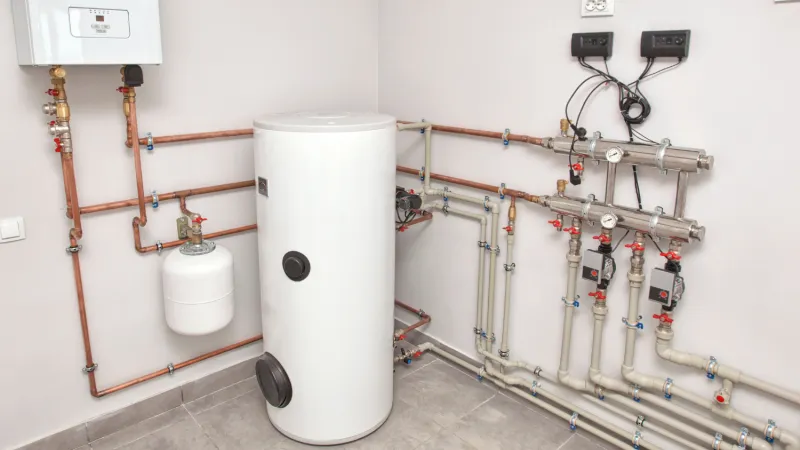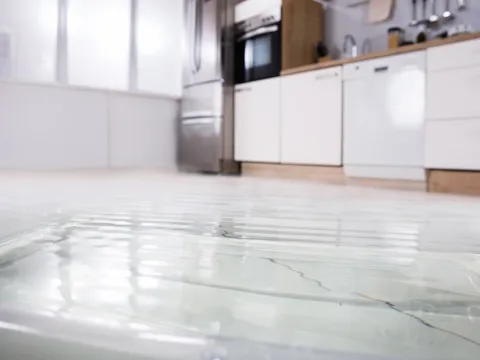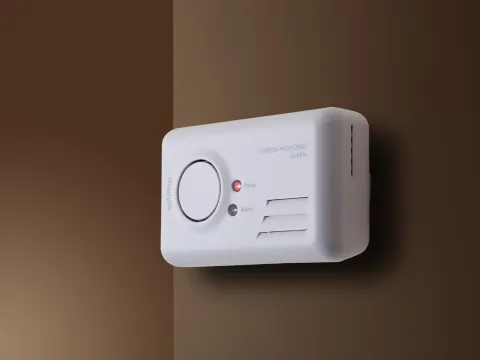
Protecting the Powerhouse: Tracking Tips For Your Mechanical Room
Summary
Reading Time
5 min
Writing it down or snapping a photo are both great ways to remember the date of when a major item in your home was purchased, but what happens when something goes wrong and you can’t find that piece of paper you scribbled on eight years ago? Or you get a new phone, and all your pictures don’t transfer over from the cloud? Moved into a new home and don’t know how old the water heater is? These are the things that just inevitably happen to policyholders everywhere, and we don’t want them to happen to you. As a gift from our Loss Control Specialists to you, there are some industry tricks that can help you date your household mechanical machines that are easier than you think. Prevent losses and have a risk-free home by maintaining upkeep and knowing how to keep dates for when things don’t go as planned with these simple tips.
1. Labels and stickers.
Almost every item that is constructed by a company will have a label. Sometimes it’s in the form of an inscription with a serial number, other times it’s a bright sticker with product details. These stickers and inscriptions can give you a serial number for your unit, which can tell you when it was manufactured originally. By knowing when a device was manufactured, you can tell its age and condition, whether it’s still under warranty, and where it was manufactured. Now, let’s get into the specifics…
- Water heater: Every water heater has a label sticker on it that provides all the information the purchaser needs about the tank. If you do a quick Google search for the name of the manufacturer, it will show you how to use the serial number listed on the label to date the appliance. A fun fact: the month and year your water heater was manufactured are always in the serial number.
- Furnace: Like water heaters, furnaces have serial numbers, too. The serial number of a furnace can be found on the inside of the front cover panel. What’s tricky is that the panel must be removed to find the label, and many homeowners don’t know this. One more tip: Don’t forget to put the panel back on; it’s your roadmap for guidance if something goes wrong.
- Windows: Windows get old and dated as well, and when they are not properly installed or taken care of, they pose a risk to your home. To check for a serial number on your home’s windows, there should be a date printed or engraved on the inside spacer bar between the panes. But how can you tell how many panes there are? Well, have you ever found yourself in a staring contest with your own reflection in the window? Bet you didn't know that the number of reflections you see is directly tied to how many panes your windows have! Even better yet, you can hold up a shiny piece of jewelry too to make it easier to see the number of panes. But hold on, don't start a counting spree just yet. Let's chat about why this quirky fact is actually pretty darn important. Double or triple-paned windows are ideal for ensuring an energy-efficient home and keeping cold drafts out. This could be something to consider if you’re intending on installing new windows in your home or making upgrades.
2. Seek out available resources.
There are tools out there at no cost to you that can help you check the date on all those crucial things in the mechanical room. The major one we recommend to you is an online resource known as The Building Intelligence Center. This organization’s goal is to make home inspections, contractor work, and decoding the ages of mechanical units in your home a breeze. It’s like having your very own Sherlock Holmes moment without spending a dime. We’re talking about water heaters, furnaces, air conditioners, boilers, heat pumps, and more. A second resource is if you know the brand name for each of your mechanical systems, you can also utilize their website to figure out the important dates and recommended servicing timeline. Not all things are the same, so utilizing these websites to promote a safe environment for your family is the best call you can make to create a risk-free home.
3. Professional assessments and support.
Time after time, we’ve seen policyholders wait until absolutely necessary to acquire professional assistance when things take a turn for the worse. Here’s the Sandbox scoop: maintenance by a professional once a year takes up much less time than total replacement of your belongings. Don’t wait until all else fails before contacting a professional; set up service checks every so often. If your water heater is more than ten years old, it should be assessed by a certified technician. Especially with furnaces and air conditioners, if they are serviced annually by a certified technician, it’s like giving your HVAC system a VIP pass to the fountain of youth, ensuring it'll stick around longer than your last houseplant.

As a homeowner, you need to practice proactive measures to prevent losses since, let's face it, life often throws curveballs, such as water heaters hiding their age like fine wines or manufacturing stickers playing hide-and-seek. It’s why having Home Insurance from Sandbox is your safety net for your contents and building, ensuring you can rebuild and recover in times of loss. Think of it like having a sandy superhero on standby, ready to swoop in and save the day when disaster strikes. After all, in the unpredictable game of homeownership, it's always better to be safe than sorry. Find the nearest Sandbox Mutual Insurance broker to you in Saskatchewan, Manitoba, or Alberta to get a Home Insurance quote.
Please note that the information in this article may not accurately reflect your insurance policy from Sandbox Mutual Insurance or another insurance company. Please refer to your policy or talk to your broker about your specific coverages.

FAQ'S
Why does it even matter how old my mechanical equipment is?
Knowing the age of your water heater, furnace, A/C, and windows isn’t just trivia — it’s a key part of preventing losses in your home. Older equipment is more likely to malfunction, leak, or quit on you altogether. By keeping track of manufacturing dates and maintenance timelines, you can stay ahead of costly breakdowns before they become claim-worthy disasters.
What if my appliances don’t have a visible date label?
Good news — most do! The dates are often hidden in the serial number, on a sticker, or engraved on the interior panel (like furnace covers). If you strike out there, free tools like The Building Intelligence Center or manufacturer websites can help you decode the age of almost any mechanical unit. And when in doubt? A certified technician can confirm it for you during your annual service check.
How often should I get my mechanical systems professionally inspected?
Aim for once a year for anything that heats, cools, or moves water around your home. Think of these tune-ups as VIP spa days for your HVAC system — they keep everything running smoothly and extend the life of your equipment. If your water heater is over 10 years old or your furnace is acting up, don’t wait for a breakdown. A quick inspection now can save you a major headache (and expense!) later.



